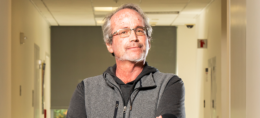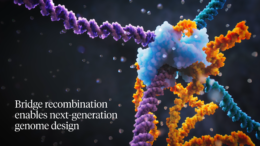Posts Tagged ‘research’
Herr Lab Postdoc Wins AIP Best Paper
Trinh Lam, a postdoc in Amy Herr’s lab, has won the Biomicrofluidics Best Paper Award from AIP Publishing at the 28th International Conference on Miniaturized Systems for Chemistry and Life Sciences – Micro-Total Analysis Systems (µTAS 2024).
Read MoreArkin Lab receives ARPA-H award for microbiome engineering
Adam Arkin has been granted an award of over $20 million from the Advanced Research Projects Agency for Health (ARPA-H) to pursue microbiome engineering to create probiotic bacterial communities that prevent and treat lung pathogens.
Read MoreAcid-degradable lipid nanoparticles enhance the delivery of mRNA
Research by Niren Murthy’s lab presents a new acid-degradable linker that rapidly hydrolyzes in endosomes but is stable in the blood, which could significantly increase the efficiency of delivering mRNA-based therapies to cells.
Read MoreNew recyclable adhesives can be easily adapted for medical, consumer and industrial applications
Messersmith Lab has created a family of polymers from a stabilized alpha-lipoic acid which could lead to versatile, high-performance and environmentally friendly recyclable adhesives.
Read MoreRevealing the Mysteries Within Microbial Genomes
Adam Arkin’s lab has developed a new technique, barcoded overexpression bacterial shotgun library sequencing (Boba-seq), that will make it much easier for researchers to discover the traits or activities encoded by genes of unknown function in microbes.
Read MoreScientists Discover Next-Generation System for Programmable Genome Design
A team of researchers led by Professor Patrick Hsu has discovered the first DNA recombinase that is programmable, allowing the user to specify any desired genomic target sequence and any donor DNA molecule to be inserted. The bridge recombinase mechanism promises to expand genome editing beyond CRISPR and RNA interference (RNAi) to offer a unified mechanism for programmable DNA rearrangements. Bioengineering graduate student Nicholas Perry is also a lead author of the study, along with other researchers from the Arc Institute.
Read MoreSo to speak: how bats and humans communicate
Berkeley researchers led by Professor Michael Yartsev, working with scientists at Carnegie Mellon University, have identified the part of the brain in Egyptian fruit bats that controls vocalizations and found that it contains similar neural wiring and genetics to the part of the human brain that controls speech.
Read MorePutting on the heat
Professor Seung-Wuk Lee discusses pyroelectricity: the finding that viruses can generate electricity when exposed to heat, and how this may pave the way for next-generation biosensors and diagnostic tools.
Read MoreCool it down
How isochoric preservation can protect food, organs — and even the planet. Professor Boris Rubinsky discusses the state of the art in cryogenics and preservation.
Read More









